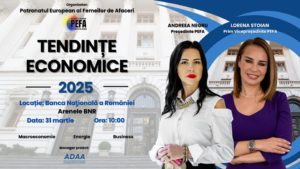Constantin Damov, Green Group: “Circular economy is based on innovation. We need to be market makers, not market trackers”

“Our number one priority should be to eliminate discrimination. There is no circular economy and no linear economy. We need to understand that there is only one economy that can behave more or less circularly.
If the circular economy is not economically efficient, it will not exist. No industry will pay more for materials than it pays today. The circular economy involves the elimination of waste. Waste is a resource that is not where it should be. I will give you an example. 20 tons of oil on the beach means pollution. 20 tons of oil in a refinery means resources,” Constantin Damov, president Green Group & Circular Economy Coalition (CERC) said at Circular Economy Conference organized by The Diplomat-Bucharest and Sustainability-Today.
Key statements:
- The circular economy is still over-regulated, but it can come with many barriers to free trade. Oil, minerals, natural resources are sold on exchanges. We operate in an over-regulated industry and we have difficulties competing with the linear industry. I insist a lot on free competition and incentive mechanisms.
- We have entered a new phase and I think we should move away from the emotion in the environmental area and move towards pragmatism that should be managed by the Ministry of Economy. In many countries in Europe, the Ministry of Environment and the Ministry of Economy work together on all the mechanisms and on strategies because it is about resources, not about waste. We are talking about industrial development and this is the moment that we must reach.
- State intervention must be minimal and must be in the form of legislation that creates opportunities and not restrictions.
- Sometimes we confuse the circular economy with recycling, and this is unfair. Recycling must be the last solution. We do not have enough levers to change behaviors, we must have a different way of consuming.
- We must limit the unnecessary consumption of resources. We are one of the countries with the most food waste. We waste a lot of resources through short-term consumption and fail to optimize consumption before recycling. We need to address the principles of circularity much higher in the area of education and behavior.
- The Circular Economy Coalition has begun to evaluate what the circular economy’s contribution to GDP is and what economic growth we can have without resource consumption. There are industries such as paper where hundreds of thousands of tons of material are obtained 100% from paper and cardboard recycling. Together with our partners at the Academy of Economic Studies, we have begun to collect data to present to the authorities the level of the circular economy’s contribution to GDP, but also the trends in the field. If we focus on these things, Romania will become more resilient and less dependent on imported raw materials.
- We need to collaborate with universities and research institutes because the circular economy is based on innovation. We need to be market makers, not market trackers.














